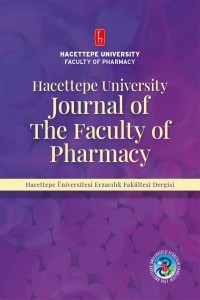The Investigation of the Relationship Between Pharmaceutical Consumption and Health Status
Canonical Correlation Analysis, EFPIA, Health Outcomes, Pharmaceutical Expenditure, Pharmaceutical Industries
The Investigation of the Relationship Between Pharmaceutical Consumption and Health Status
Canonical Correlation Analysis, EFPIA, Health Outcomes, Pharmaceutical Expenditure, Pharmaceutical Industries,
___
- 1. World Health Organization: Road Map For Access To Medicines, Vaccines And Other Health Products 2019-2023. Geneva, 2019.
- 2. World Health Organization: WHO Drug Information. Quality Assurance News. 2021, 34(4):802-928.
- 3. OECD/European Union: Health at a Glance: Europe 2020: State of Health in the EU Cycle. OECD Publishing, Paris, 2020.
- 4. Das V, Das RK: Urban health and pharmaceutical consumption in Delhi, India. Journal of Biosocial Science 2006, 38(1):69- 82. https://doi.org/10.1017/S002193200500091X
- 5. Perehudoff K, Hoen E. Human Rights and Intellectual Property for Universal Access to New Essential Medicines. In Equitable Access to High-Cost Pharmaceuticals, Academic Press. 2018: pp 67-87.
- 6. OECD: Health at a Glance 2021: OECD Indicators, OECD Publishing, Paris, 2021.
- 7. World Health Organization: Preventing chronic diseases: a vital investment: WHO global report. Geneva, 2005.
- 8. Afshin A, Micha R, Webb M, Capewell S, Whitsel L, Rubinstein A, Mozaffarian D: Cardiovascular, Respiratory, and Related Disorders. 3rd ed. Chapter 1. Praphakaran ve diğerleri içinde, Effectiveness of Dietary Policies to Reduce Noncommunicable Diseases, The International Bank for Reconstruction and Development/The World Bank. Washington, 2017.
- 9. Jarab AS, AlQudah SG, Khdour M, Shamssain M, Mukattash TL: Impact of pharmaceutical care on health outcomes in patients with COPD. International Journal of Clinical Pharmacy 2012, 34(1):53-62. https://doi.org/10.1007/s11096-011- 9585-z
- 10. Sturm H, Austvoll-Dahlgren A, Aaserud M, Oxman AD, Ramsay CR, Vernby Å, Kösters JP: Pharmaceutical policies: effects of financial incentives for prescribers. Cochrane Database of Systematic Reviews 2007, (3). https://doi. org/10.1002/14651858.CD006731
- 11. Miller RD, Frech HE: Is there a link between pharmaceutical consumption and improved health in OECD countries? Pharmacoeconomics 2000, 18(1):33-45. https://doi. org/10.2165/00019053-200018001-00006
- 12. Bergner M: Measurement of health status. Medical care 1985, 23(5):696-704.
- 13. Or Z: Exploring the Effects of Health Care on Mortality Across OECD Countries, OECD Labour Market and Social Policy Occasional Papers, No. 46, OECD Publishing, Paris, 2001.
- 14. Berger MC, Messer J: Public financing of health expenditures, insurance, and health outcomes. Applied Economics 2002, 34(17):2105-2113. https://doi. org/10.1080/00036840210135665
- 15. Nixon J, Ulmann P: The relationship between health care expenditure and health outcomes. The European Journal of Health Economics 2006, 7(1):7-18. https://doi.org/10.1007/ s10198-005-0336-8
- 16. Novignon J, Olakojo SA, Nonvignon J: The effects of public and private health care expenditure on health status in sub-Saharan Africa: new evidence from panel data analysis. Health economics review 2012, 2(1):1-8. https://doi. org/10.1186/2191-1991-2-22
- 17. Blázquez Fernández C, González Prieto N, Moreno Mencía: Pharmaceutical expenditure as a determinant of health outcomes in EU countries. Estudios de Economia Aplicada 2013, 31(2):379-396. https://doi.org/10.25115/eea.v31i2.3332
- 18. Emmanuel Guindon G, Contoyannis P: A second look at pharmaceutical spending as determinants of health outcomes in Canada. Health Economics 2012, 21(12):1477-1495. https:// doi.org/10.1002/hec.1415
- 19. Crémieux PY, Meilleur MC, Ouellette P, Petit P, Zelder M, Potvin K: Public and private pharmaceutical spending as determinants of health outcomes in Canada. Health economics 2005, 14(2):107-116. https://doi.org/10.1002/hec.922
- 20. Çınaroğlu S: İlaç Harcamalarının Sağlık Sonuçları İle İlişkisi: Bir Kanonik Korelasyon Analizi Uygulaması, H Hacettepe Üniversitesi İktisadi ve İdari Bilimler Fakültesi Dergisi 2017, 35(2):23-47. https://doi.org/10.17065/huniibf.324724
- 21. Hsieh CR, Lo KTV, Hong Y, Shih YCT. Pharmaceutical innovation and health outcomes: empirical evidence from Taiwan. Pharmaceutical Innovation: Incentives, competition, and costbenefit analysis in international perspective. F. Sloan and C.-R. Hsieh. New York, Cambridge University Press 2007, 242-260.
- 22. Shaw JW, Horrace WC, Vogel RJ: The determinants of life expectancy: an analysis of the OECD health data. Southern Economic Journal 2005, 71(4):768-783. https://doi. org/10.2307/20062079
- 23. Frech HE, Miller RD: The effects of pharmaceutical consumption and obesity on the quality of life in the Organization of Economic Cooperation and Development (OECD) countries. Pharmacoeconomics 2004, 22(2):25-36. https://doi. org/10.2165/00019053-200422002-00004
- 24. EFPIA: Who we are. 2022 December 6. Available from: https://www.efpia.eu/about-us/who-we-are/ [Website]
- 25. De Looper MG, Lafortune G: Measuring Disparities in Health Status and in Access and Use of Health Care in OECD Countries, OECD Health Working Papers, No. 43, OECD Publishing, Paris, 2009.
- 26. Karagöz Y: SPSS-AMOS-META Uygulamalı İstatistiksel Analizler. 2nd edition. Nobel Publishing; Ankara, 2016.
- 27. Alpar R: Uygulamalı Çok Değişkenli İstatistiksel Yöntemler, 5nd edition, Detay Publishing; Ankara, 2017.
- 28. Ünlükaplan İ: The Spesification of the Relationship Between Economic Development, Competitiveness and Innovation in European Union Using Canonical Correlation Analysis. Maliye Dergisi 2009, 157(2):235-250.
- 29. Kalaycı Ş: SPSS Uygulamalı Çok Değişkenli İstatistik Teknikleri. Ankara: Asil Yayın Dağıtım, 2008.
- 30. Jimmy B, Jose J: Patient medication adherence: measures in daily practice. Oman Med J 2011. 226(3):155-9. https://doi. org/10.5001/omj.2011.38
- 31. Koala D, Yahouni Z, Alpan G, Frein Y: 2021. Factors influencing Drug Consumption and Prediction Methods. arXiv preprint 2021.
- 32. Adriaenssens N, Coenen S, Muller A, Vankerckhoven V, Goossens H: ESAC Project Group. European Surveillance of Antimicrobial Consumption (ESAC): outpatient systemic antimycotic and antifungal use in Europe. Journal of antimicrobial chemotherapy 2010, 65(4):769-774. https://doi.org/10.1093/ jac/dkq023
- 33. Eurofound: Living, working and COVID-19 dataset. 2022 December 6. Available from: https://www.eurofound.europa.eu/ data/covid-19/quality-of-public-services [Website]
- Yayın Aralığı: Yılda 4 Sayı
- Başlangıç: 1981
- Yayıncı: Hacettepe Üniversitesi Eczacılık Fakültesi Dekanlığı
Migren Araştırmalarında Kullanılan Güncel Hayvan Modelleri
Melih Zeki KAYA, Sibel BOZDAĞ PEHLİVAN, Levent ÖNER
The Investigation of the Relationship Between Pharmaceutical Consumption and Health Status
Meshva PATEL, Mehul PATEL, Komal PARMAR, Tejal SONİ, Dr. Bhanubhai SUHAGİA
Netrin-1 ve Reseptörlerinin Çeşitli Kanserlerdeki Rolü
Nisha Shri CHENGAMA RAJU, Tee SİEW YİNG
Neopterin Düzeylerinin ve Kinürenin Yolağının Akut Koroner Sendrom Hastalarında Değerlendirilmesi
İbrahim KEMBER, Gözde GİRGİN, Terken BAYDAR
Navneetha OLETİ, Hemalatha SATTU, Munı Sıreesha SUNKARA, Pranitha KURELLA, Sahithi MANCHI
Volodymyr SHVETS, Hanna MASLAK, Vadim DAVYDOV, Halyna BEREST, Inna NOSULENKO, Oleksii VOSKOBOİNİK, Liudmyla OMELİANCHYK, Oleksandr BRAZHKO
